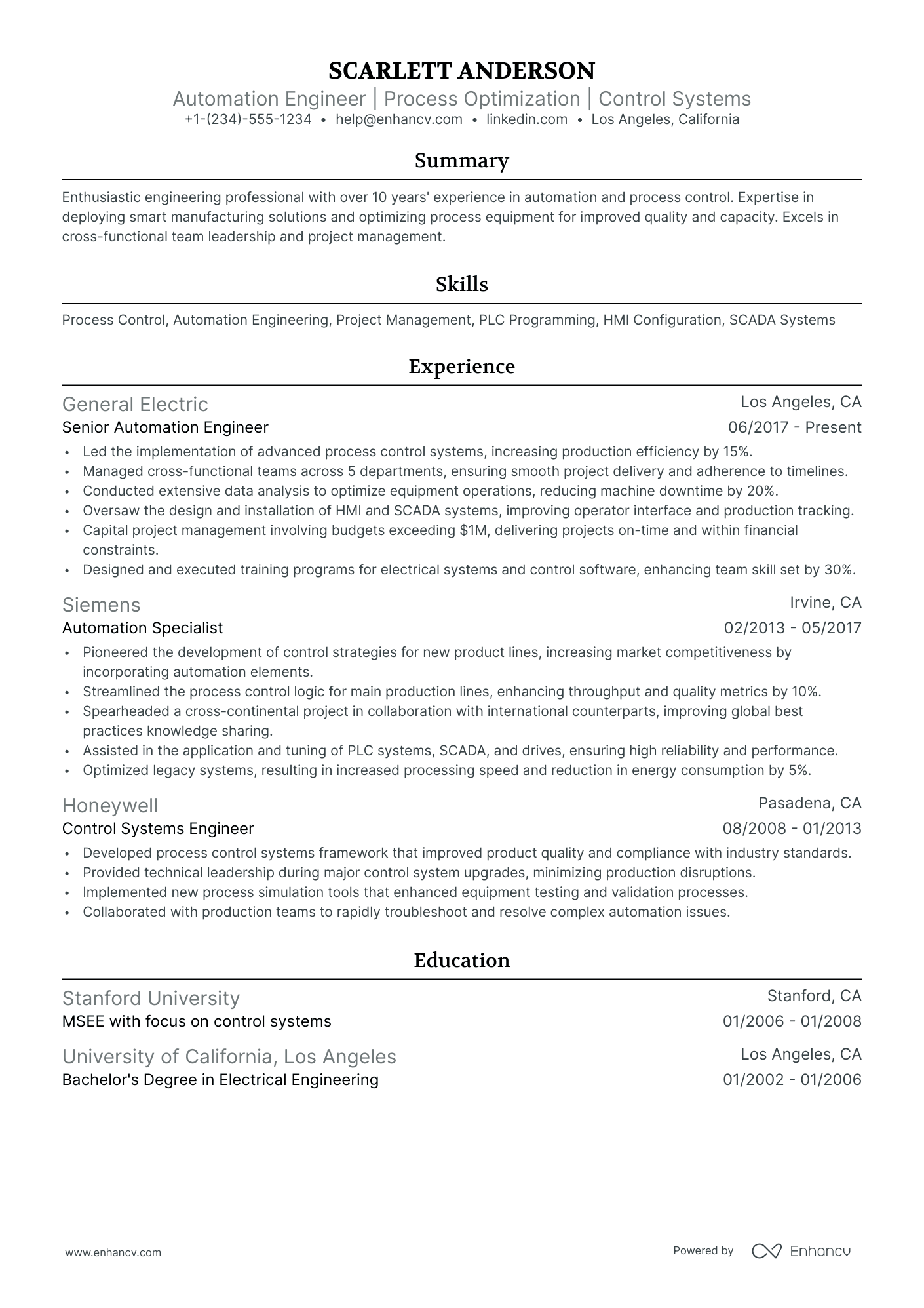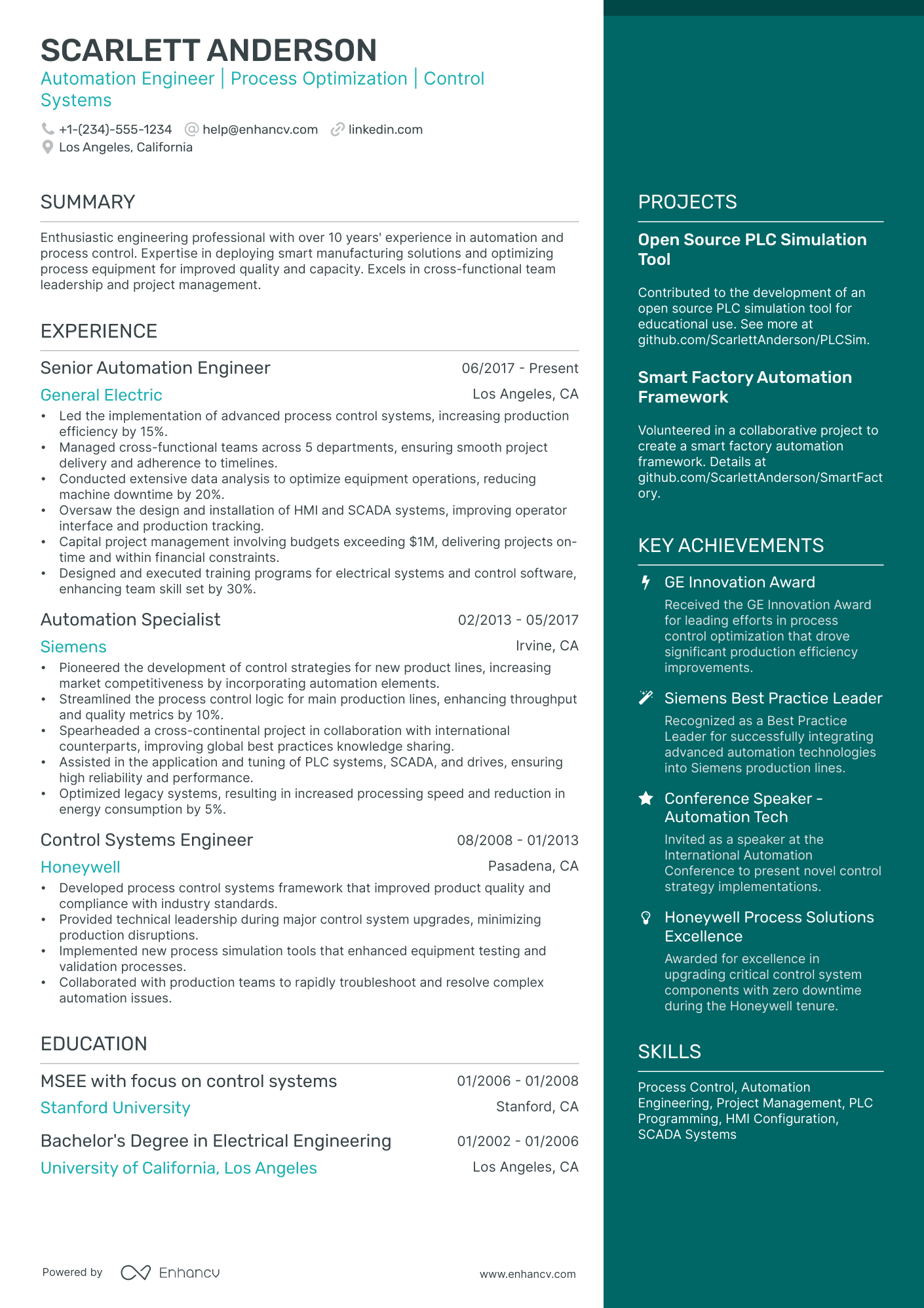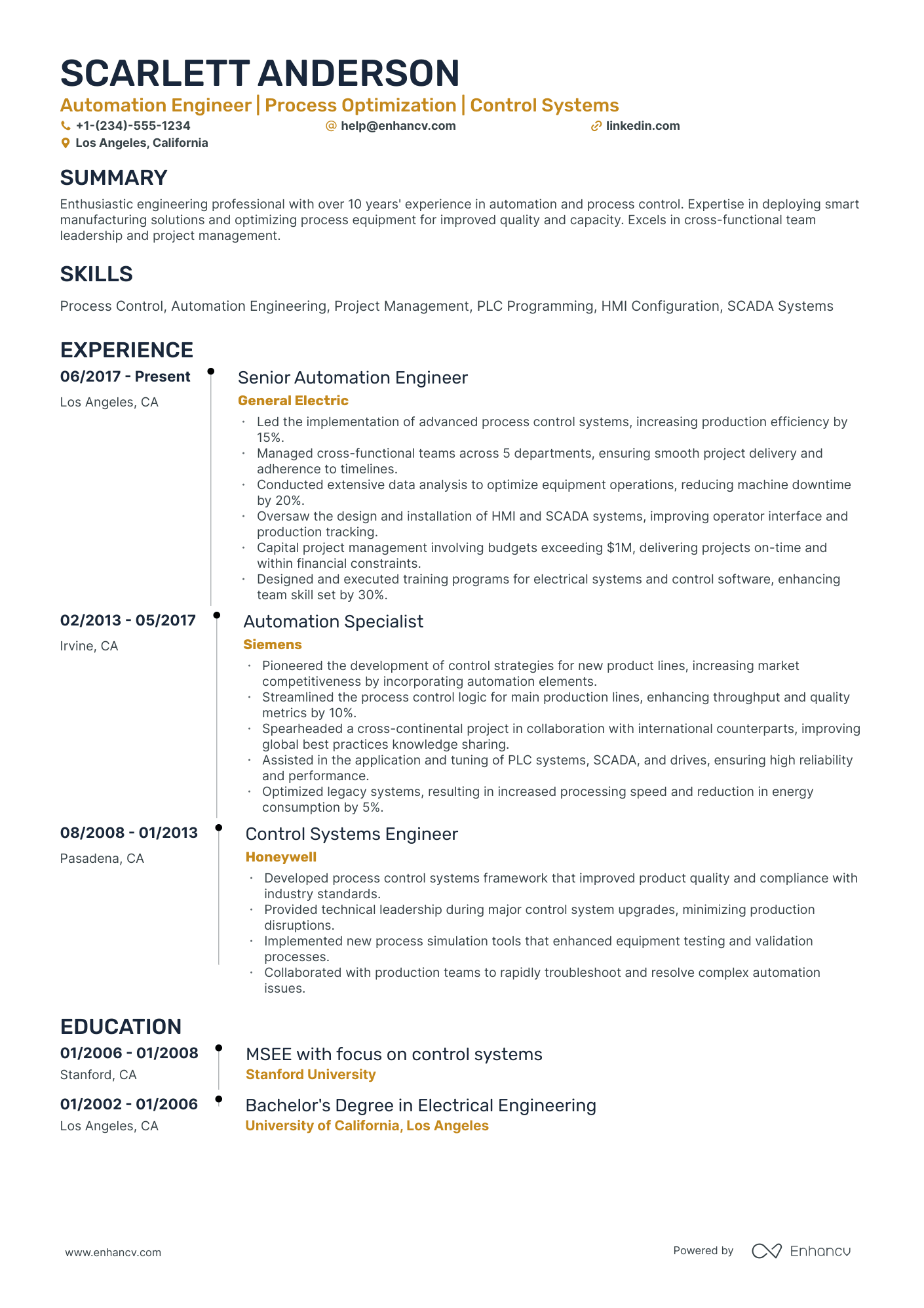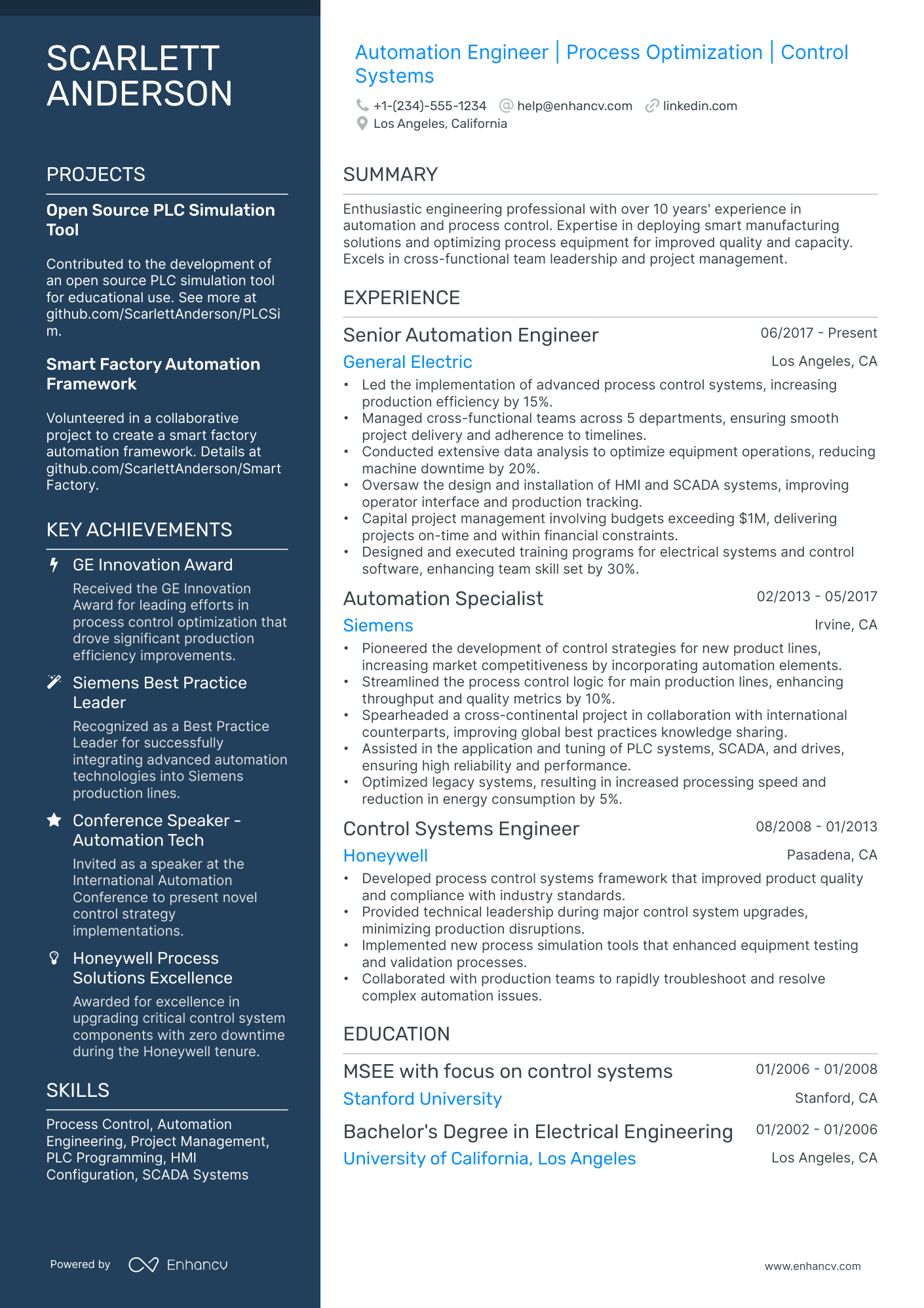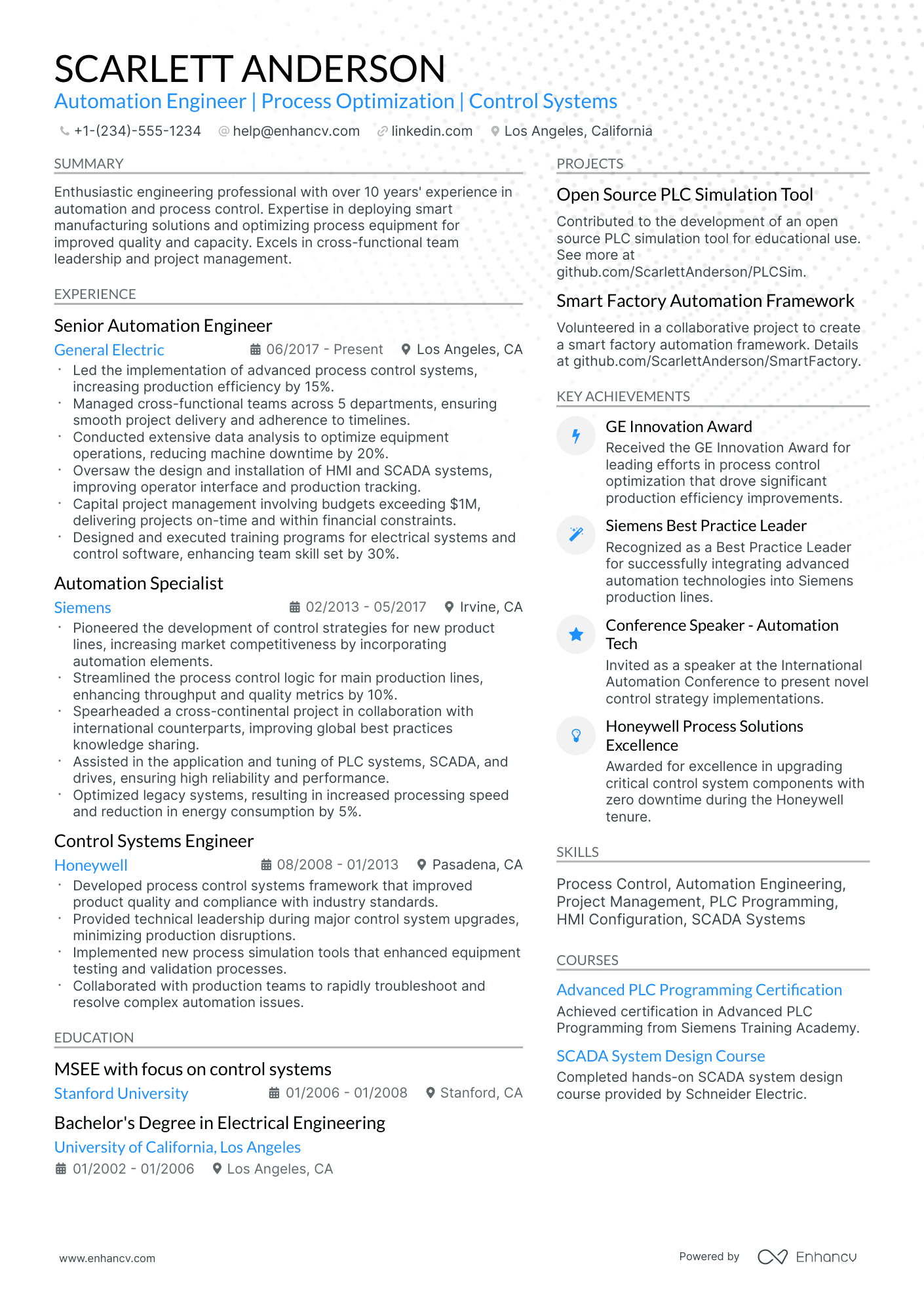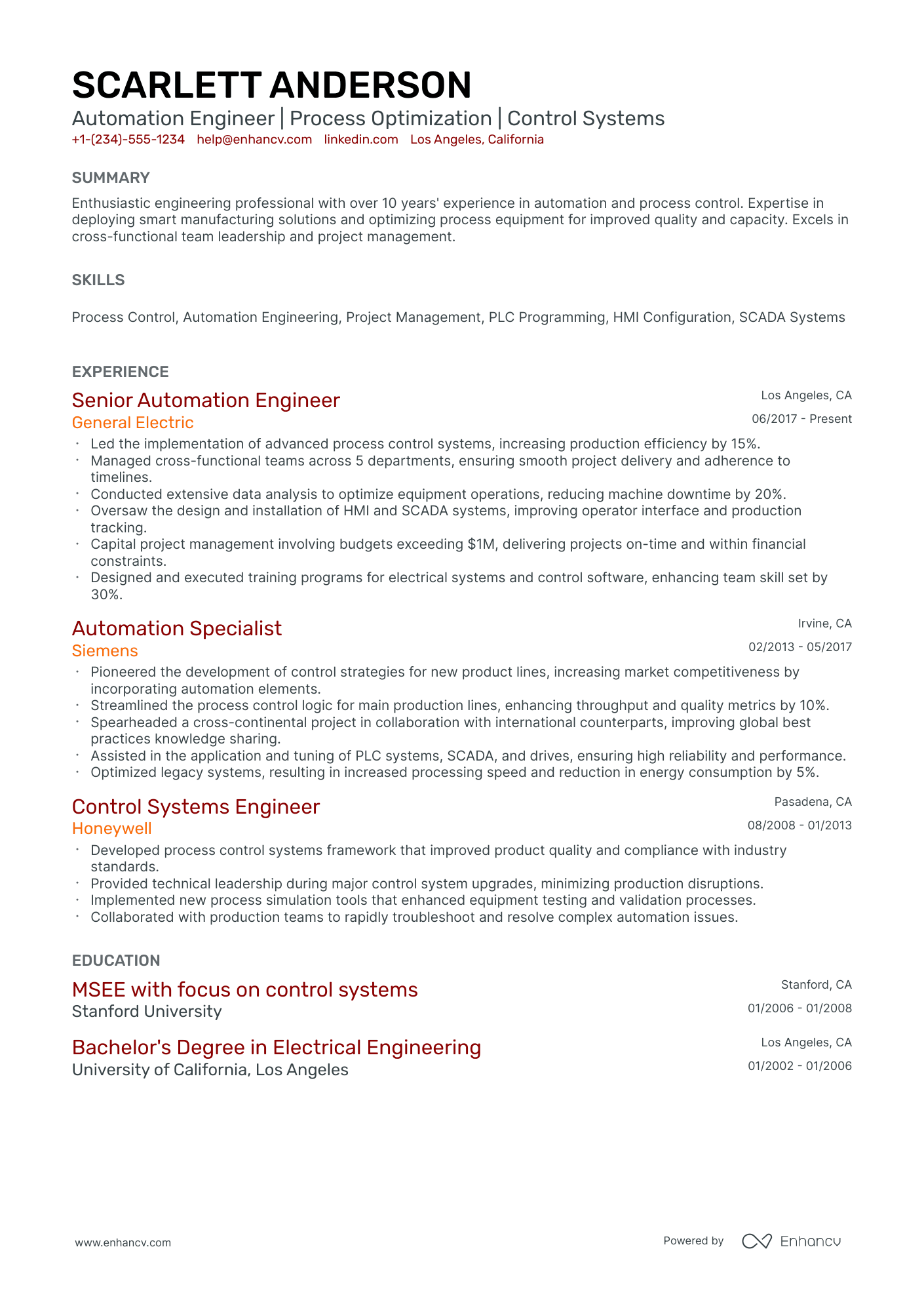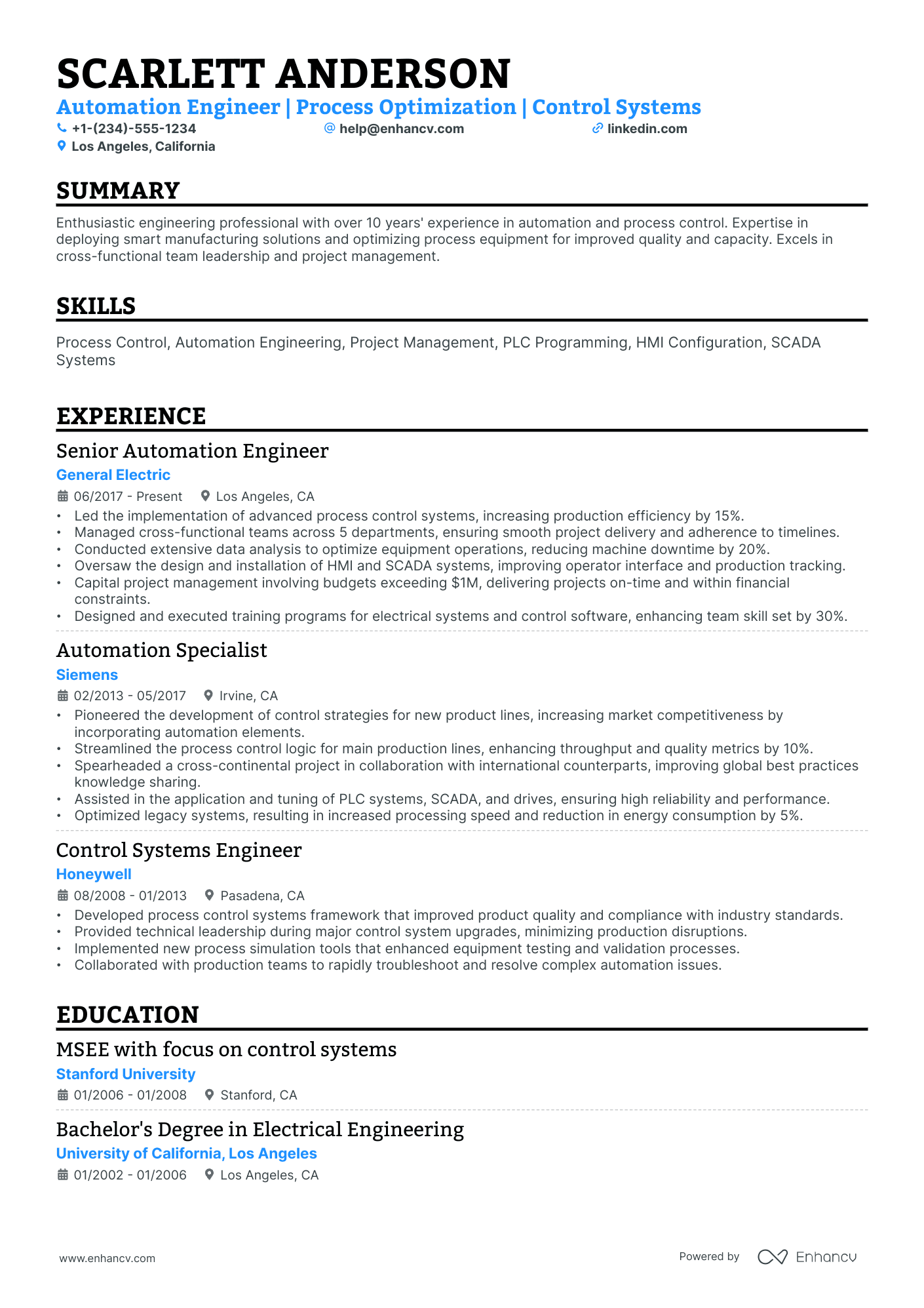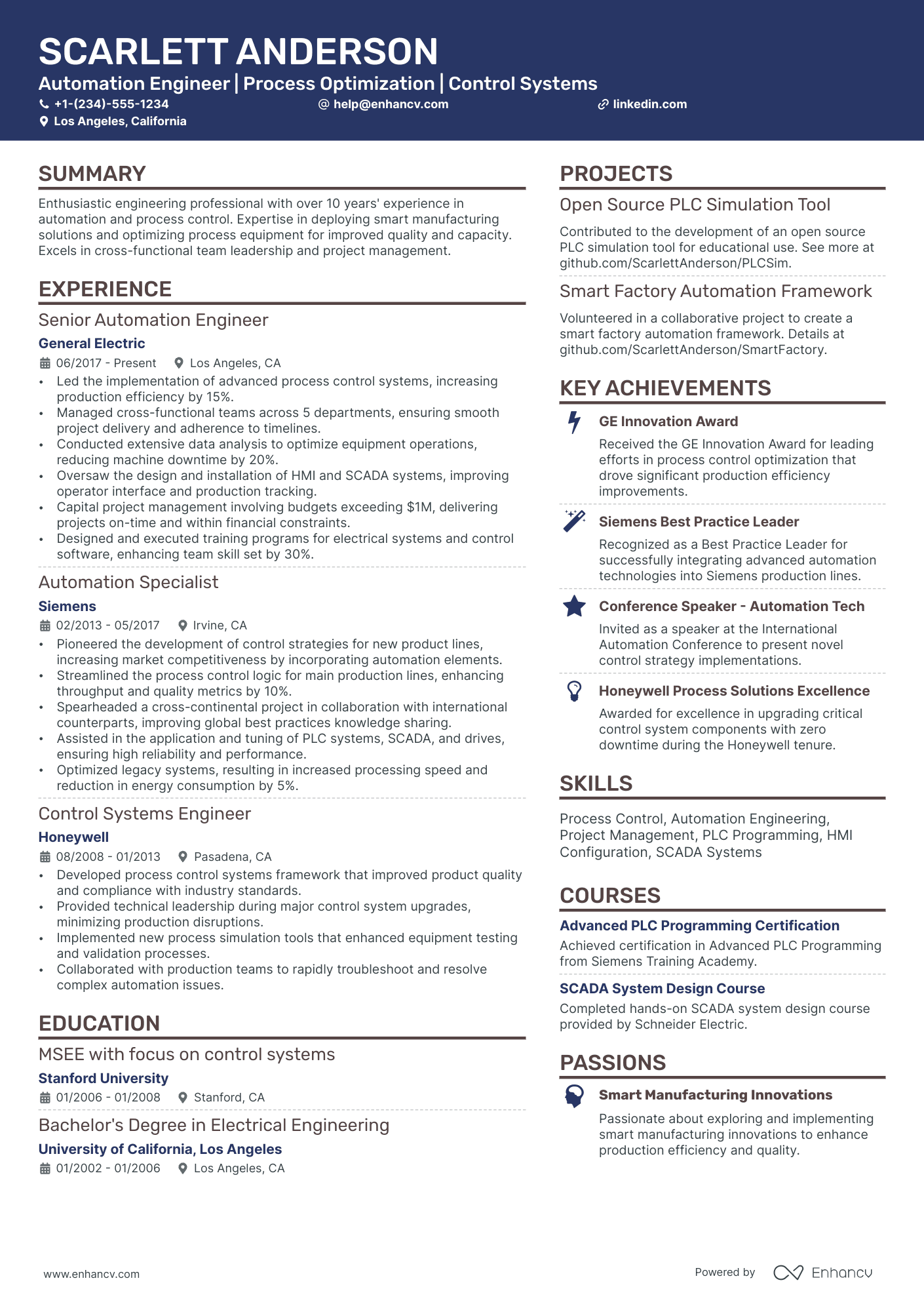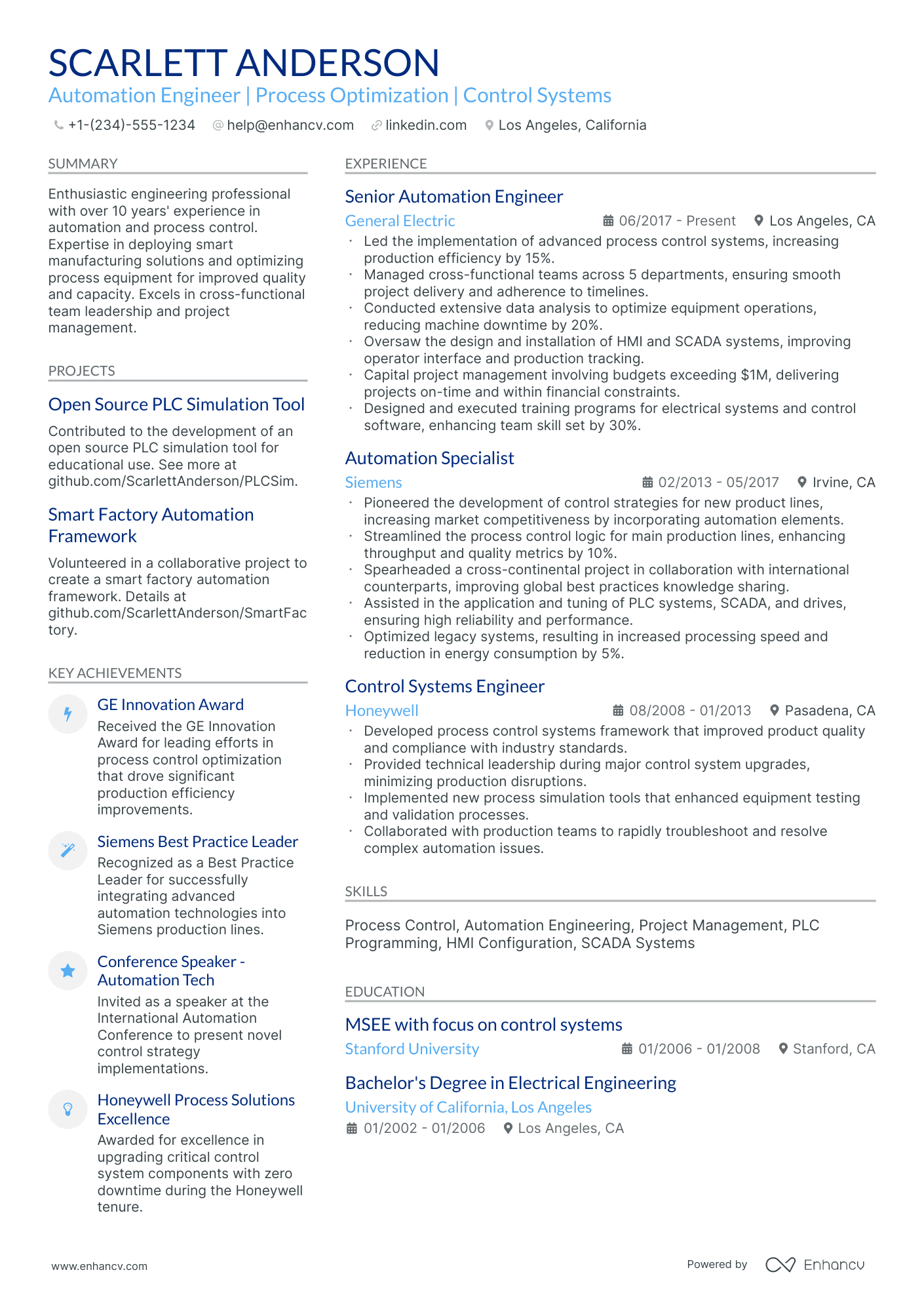As a control systems engineer, articulating the complexity of your projects and technical skills on a resume without overwhelming the reader is a significant challenge. Our guide provides clear strategies and examples to help you concisely convey the depth of your expertise and ensure your resume stands out effectively to potential employers.
- Control systems engineer resumes that are tailored to the role are more likely to catch recruiters' attention.
- Most sought-out control systems engineer skills that should make your resume.
- Styling the layout of your professional resume: take a page from control systems engineer resume examples.
How to write about your control systems engineer achievements in various resume sections (e.g. summary, experience, and education).
- IT Delivery Manager Resume Example
- System Analyst Resume Example
- IT Infrastructure Project Manager Resume Example
- Node Js Developer Resume Example
- Cnc Programmer Resume Example
- SAS Clinical Programmer Resume Example
- Help Desk Manager Resume Example
- Site Reliability Engineer Resume Example
- IT Operations Manager Resume Example
- Application Engineer Resume Example
Simple guide to your control systems engineer resume format and layout
Successful control systems engineer resumes all have one specific characteristic - candidates have invested in a simple resume layout . One that is easy to read, makes a good first impression, and is adapted to their professional experience. There are three distinct resume formats to help you focus on your:
- professional experience - use the reverse-chronological resume format;
- skills and achievements - via the functional skill-based resume format;
- both experience and skills - with a hybrid resume format .
What is more, keep in mind that your resume may be initially assessed by the ATS (Applicant Tracker System) (or the software used by companies in the hiring process). The control systems engineer resumes that suit the ATS:
- have a header that includes either a role keyword or the job you're applying for;
- should be no longer than two pages;
- be submitted as PDF, unless specified otherwise.
Be mindful of regional differences in resume formats – a Canadian layout, for instance, might vary.
Upload & Check Your Resume
Drop your resume here or choose a file. PDF & DOCX only. Max 2MB file size.
PRO TIP
List all your relevant higher education degrees within your resume in reverse chronological order (starting with the latest). There are cases when your PhD in a particular field could help you stand apart from other candidates.
The key to your control systems engineer job-winning resume - present your expertise with these sections:
- A header to make your resume more scannable
- Snapshot of who you are as a professional with your resume soft skills, achievements, and summary or objective
- Job advert keywords in the skills section of your resume
- Resume experience quantifying your past job successes with metrics
- A relevant education, certification, and technical sills section to provide background to your technological/software capabilities
What recruiters want to see on your resume:
- Experience with programming and simulation tools such as MATLAB, Simulink, or LabVIEW
- Understanding and application of control theory and systems design — such as PID controllers, state-space, or adaptive controls
- Proven ability in designing and implementing control systems for real-world applications like robotics, aerospace, automotive, or industrial automation
- Familiarity with PLCs, microcontrollers, and hardware interfaces (e.g., PWM, ADC, serial communication)
- Knowledge of industry-specific standards and protocols (e.g., ISO 26262 for automotive, DO-178B/C in aerospace)
Quick formula for writing your control systems engineer resume experience section
Have you ever wondered why recruiters care about your control systems engineer expertise?
For starters, your past roles show that you've obtained the relevant on-the job training and expertise that'd be useful for the role.
What is more, the resume work experience section isn't just your work history , but:
- shows what you're capable of achieving based on your past success;
- proves your skills with (oftentimes, tangible) achievements;
- highlights the unique value of what it's like to work with you.
To ensure your resume work experience section is as effective as possible, follow this formula:
- start each bullet with a powerful, action verb , followed up by your responsibilities, and your workplace success.
The more details you can include - that are relevant to the job and linked with your skill set - the more likely you are to catch recruiters' attention.
Additionally, you can also scan the job advert for key requirements or buzzwords , which you can quantify across your experience section.
Not sure what we mean by this? Take inspiration from the control systems engineer resume experience sections below:
- Led the design and implementation of advanced control algorithms for improved system stability and efficiency in HVAC systems, achieving a 15% reduction in energy consumption for the organization.
- Collaborated with a cross-functional team to integrate control systems with IoT devices for real-time data monitoring, leading to a 25% improvement in predictive maintenance schedules.
- Managed a critical migration from legacy PLC systems to modern DCS platforms, ensuring seamless transitions with zero downtime during the process.
- Developed robust PID control loops for chemical processing equipment that increased production quality and consistency, resulting in an annual savings of $500,000 in rework costs.
- Directed the standardization of control system programming practices across the company, leading to a 50% decrease in troubleshooting and maintenance time.
- Initiated and led a software upgrade for SCADA systems that enhanced system responsiveness and interactive capabilities for operators.
- Optimized automated assembly lines using feedback control system design that boosted productivity by 30% and reduced manual inspection requirements.
- Co-designed a state-of-the-art control system for a new product line, which was recognized for exceptional performance in a competitive industry award.
- Provided expertise in the lifecycle of control systems, from conceptual design to decommissioning, ensuring technical support and system reliability throughout.
- Spearheaded the development and calibration of an engine control system that increased fuel efficiency by 10% in next-generation hybrid vehicles.
- Authored technical documentation and training materials that enhanced knowledge transfer to junior engineers about control system strategies, resulting in decreased onboarding time by 40%.
- Successfully managed vendor relations to ensure the procurement of high-quality sensors and actuators, meeting the stringent requirements of the automotive industry.
- Implemented advanced control system solutions for water treatment facilities, contributing to a 20% improvement in waste reduction and regulatory compliance.
- Conducted rigorous system simulations to validate control strategies before deployment, minimizing the risk of operational failures and ensuring customer satisfaction.
- Actively participated in the emergency response team that tackled control system outages, consistently restoring operations within critical timeframes.
- Customized aerospace control systems for unmanned aerial vehicles that enhanced navigational accuracy and reliability in challenging environments.
- Mastered the application of redundancy management techniques in control systems, significantly improving flight safety and mission success rates.
- Contributed to a multi-disciplinary team that achieved a contract renewal for developing next-gen control technologies, securing $2M in future funding.
- Introduced machine learning algorithms into existing control systems to adaptively optimize performance in real-time, enhancing processing speeds by 35%.
- Led a successful proof-of-concept project for self-tuning control systems in the oil and gas industry, facilitating an increase in extraction rates.
- Fostered a culture of continuous improvement by mentoring junior engineers on advanced control theories and practical applications in energy systems.
- Orchestrated the integration of control systems with blockchain technology to ensure data integrity and security in smart grid applications.
- Engineered state-of-the-art control models for renewable energy sources, contributing to the grid stability and a 50% increase in efficiency during peak load times.
- Pioneered remote monitoring protocols enabling predictive maintenance, extending the lifecycle of renewable energy assets and decreasing field service costs by 30%.
The following content includes information from "O*NET OnLine" by the U.S. Department of Labor, Employment and Training Administration (USDOL/ETA). Used under the CC BY 4.0 license. The data represents the top responsibilities present on the task lists for control systems engineer professionals.
Top Responsibilities for Control Systems Engineer:
- Design electronic components, software, products, or systems for commercial, industrial, medical, military, or scientific applications.
- Operate computer-assisted engineering or design software or equipment to perform electronics engineering tasks.
- Evaluate project work to ensure effectiveness, technical adequacy, or compatibility in the resolution of complex electronics engineering problems.
- Direct or coordinate activities concerned with manufacture, construction, installation, maintenance, operation, or modification of electronic equipment, products, or systems.
- Confer with engineers, customers, vendors, or others to discuss existing or potential electronics engineering projects or products.
- Provide technical support or instruction to staff or customers regarding electronics equipment standards.
- Recommend repair or design modifications of electronics components or systems, based on factors such as environment, service, cost, or system capabilities.
- Prepare documentation containing information such as confidential descriptions or specifications of proprietary hardware or software, product development or introduction schedules, product costs, or information about product performance weaknesses.
- Develop or perform operational, maintenance, or testing procedures for electronic products, components, equipment, or systems.
- Analyze electronics system requirements, capacity, cost, or customer needs to determine project feasibility.
Quantifying impact on your resume
- Quantify the number of control systems projects managed or contributed to, demonstrating the extent of your professional experience.
- List the percentage of system uptime or reliability achieved through your control solutions to highlight efficiency and dependability.
- Specify the budget size of projects you've overseen to provide a sense of your financial and resource management capabilities.
- Indicate the scale of the processes automated, such as the number of machines or systems, to showcase the scope of your expertise.
- Mention any reductions in energy usage or waste due to your control optimizations, as this reflects your contribution to cost-saving initiatives.
- Highlight improvements in production rate or product quality that resulted from your control systems, pointing to your direct impact on business outcomes.
- Detail any reductions in downtime due to your maintenance or troubleshooting efforts to show your role in enhancing operational continuity.
- Document any training programs you developed or led, including the number of engineers trained, to emphasize your leadership and knowledge transfer skills.
Action verbs for your control systems engineer resume
No experience, no problem: writing your control systems engineer resume
You're quite set on the control systems engineer role of your dreams and think your application may add further value to your potential employers. Yet, you have no work experience . Here's how you can curate your resume to substitute your lack of experience:
- Don't list every single role you've had so far, but focus on ones that would align with the job you're applying for
- Include any valid experience in the field - whether it's at research or intern level
- Highlight the soft skills you'd bring about - those personality traits that have an added value to your application
- Focus on your education and certifications, if they make sense for the role.
Recommended reads:
PRO TIP
Mention specific courses or projects that are pertinent to the job you're applying for.
The right balance between hard skills and soft skills for your control systems engineer resume
Wondering what the perfect control systems engineer resume looks like? The candidate's profile meets job requirements by balancing both hard skills and soft skills across their resume.
- Hard skills are all the technologies you're apt at using . Prove you have the right technical background by listing key industry hardware/software in your control systems engineer resume skills section and noteworthy certifications.
- Soft skills are both your personal, mindset, communication, analytical, and problem-solving talents . Use your control systems engineer resume achievements section to show how you've used a particular soft skill to reach a tangible outcome.
When writing about your unique skill set, always make sure to refer back to the job advert to see what are the key requirements. This ensures you've tailored your resume so that it matches closer to what the ideal candidate profile is.
Top skills for your control systems engineer resume:
PID Control
MATLAB/Simulink
PLC Programming
SCADA Systems
HMI Development
Control Theory
Embedded Systems
Signal Processing
Industrial Automation
Model Predictive Control
Problem Solving
Communication
Teamwork
Attention to Detail
Analytical Thinking
Project Management
Adaptability
Critical Thinking
Time Management
Creativity
Next, you will find information on the top technologies for control systems engineer professonals from "O*NET OnLine" by the U.S. Department of Labor, Employment and Training Administration (USDOL/ETA). Used under the CC BY 4.0 license.
Top technologies for Control Systems Engineer’s resume:
- Autodesk AutoCAD
- Dassault Systemes SolidWorks
- Microsoft PowerPoint
- C
- National Instruments LabVIEW
PRO TIP
If you happen to have some basic certificates, don't invest too much of your control systems engineer resume real estate in them. Instead, list them within the skills section or as part of your relevant experience. This way you'd ensure you meet all job requirements while dedicating your certificates to only the most in-demand certification across the industry.
Listing your education and certifications on your control systems engineer resume
Don't underestimate the importance of your resume education section . As it may hint at various skills (and experience) that are relevant to the job. When writing your education section:
- Include only higher education degrees with information about the institution and start/end dates
- If you're in the process of obtaining your degree, include your expected graduation date
- Consider leaving off degrees that aren't relevant to the job or industry
- Write a description of your education if it presents you with an opportunity to further showcase your achievements in a more research-focused environment
When describing your certifications on your resume, always consider their relevancy to the role. Use the same format to describe them as you would for your education. If you're wondering what the best certificates out there are for control systems engineer roles, check out the list below.
The top 5 certifications for your control systems engineer resume:
- Professional Engineer (PE) - National Society of Professional Engineers (NSPE)
- Certified Automation Professional (CAP) - International Society of Automation (ISA)
- Certified Control Systems Technician (CCST) - International Society of Automation (ISA)
- Project Management Professional (PMP) - Project Management Institute (PMI)
- Functional Safety Engineer (FSE) - TÜV Rheinland
The content below includes information from "O*NET OnLine" by the U.S. Department of Labor, Employment and Training Administration (USDOL/ETA). Used under the CC BY 4.0 license. The data represents the top associations for control systems engineer professionals.
Top US associations for a Control Systems Engineer professional
- Accreditation Board for Engineering and Technology
- American Society for Engineering Education
- Association of Old Crows
- Institute of Electrical and Electronics Engineers
- International Society of Automation
PRO TIP
Highlight any significant extracurricular activities that demonstrate valuable skills or leadership.
Recommended reads:
Choosing between a control systems engineer resume summary or objective
Many may argue that, in recent times, the control systems engineer resume summary or objective has become completely obsolete.
But the reality is different as both of these resume sections provide you with an opportunity to :
- integrate control systems engineer-vital keywords
- showcase your accomplishments
- answer why you're applying for this particular role.
The difference (between the summary and the objective) is that the:
- Resume objective puts your career goals in a more prominent position.
- Resume summary focuses more on career milestones.
We recommend you select the summary if you happen to have plenty of experience you'd like to spotlight from the very start of your control systems engineer resume.
Meanwhile, the objective is ideal for those candidates who'd like to further prove their suitability for the role with their goals and soft skills.
We've featured some industry professional control systems engineer resume samples to the best resume summary and objective structures:
Resume summaries for a control systems engineer job
- Seasoned control systems engineer with over a decade of experience in the automation industry, proficient in developing and implementing complex control strategies for high-speed machinery. Key strengths include expertise in PID tuning, motion control, and PLC programming, with a notable accomplishment of reducing system downtime by 30% for a Fortune 500 manufacturing client.
- Dedicated Mechanical Engineer transitioning into control systems engineering, offering a solid foundation in thermodynamics and mechanics of materials complemented by a recent Master's degree in Control Systems. Eager to apply analytical and design skills to optimize control processes and contribute to impactful projects within the aerospace sector.
- With over 8 years of expertise in electrical engineering and a specialization in digital signal processing, I am now embracing the challenges of control systems engineering. Keen to leverage my extensive knowledge of circuit design and embedded systems to enhance automation solutions within the renewable energy industry.
- Driven recent graduate with a Master's degree in control systems engineering, motivated to apply theoretical knowledge and hands-on lab experience in real-world situations. Strong foundation in model-based design, system simulation, and a passion for robotics, aiming to deliver cutting-edge solutions for smart grid applications.
- As an individual transitioning into the dynamic field of control systems engineering, my goal is to integrate my background in information technology and data analysis with newfound knowledge in control theory, eager to contribute a unique perspective and analytical skills to advance autonomous system technologies.
- Looking to begin a fulfilling career as a control systems engineer with a focus on applying my recent academic training in control theory, signal processing, and systems modeling to practical challenges in the field, while fostering a deep-seated enthusiasm for innovation in industrial automation systems.
Average salary info by state in the US for control systems engineer professionals
Local salary info for Control Systems Engineer.” Source: My Next Move, National Center for O*NET Development. Accessed 10/15/2024
| State | Average Salary (in USD) |
|---|---|
| US National Average | $119,200 |
| California (CA) | $145,080 |
| Texas (TX) | $124,450 |
| Florida (FL) | $114,500 |
| New York (NY) | $104,160 |
| Pennsylvania (PA) | $101,200 |
| Illinois (IL) | $104,170 |
| Ohio (OH) | $103,680 |
| Georgia (GA) | $114,900 |
| North Carolina (NC) | $98,630 |
| Michigan (MI) | $103,020 |
Additional valuable control systems engineer resume sections to stand out
When assessing candidate applications, recruiters are often on the lookout for elements that go beyond meeting standard requirements and technical expertise.
This is where extra sections could play a key role in showcasing your unique skill set and personality.
Make sure to include sections dedicated to:
- How you spend your free time, outside of work. The interests resume section also goes to show your personality and transferrable skills; and may also serve to fill in gaps in your experience;
- Most innovative work. The projects resume section brings focus to what you're most proud of within the field;
- How you're able to overcome language barriers. The language resume section is always nice to have, especially if communication would be a big part of your future role;
- Industry-wide recognitions. Remember that the awards resume section should highlight your most noteworthy accolades and prizes.
Key takeaways
- Pay special attention to the tiny details that make up your control systems engineer resume formatting: the more tailored your application to the role is, the better your chances at success would be;
- Select the sections you include (summary or objective, etc.) and formatting (reverse-chronological, hybrid, etc.) based on your experience level;
- Select experience items and, consequently, achievements that showcase you in the best light and are relevant to the job;
- Your profile will be assessed both based on your technical capabilities and personality skills - curate those through your resume;
- Certifications and education showcase your dedication to the particular industry.
